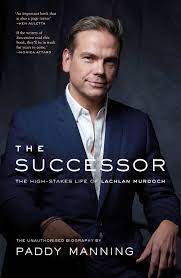In September 2023, Rupert Murdoch, the 92 year old patriarch of the influential media family, announced he was retiring from Fox and News Corporation and handing the reigns to his eldest son Lachlan. While the news of his departure was not unexpected, it remains to be seen what influence he will continue to hold as 'chairman emeritus' or whether he will truly let go of the reins.
The Murdoch family are synonymous with a form of tabloid journalism that I find odious. In Australia, NewsCorp has a tremendous influence, with a near-monopoly on newspapers. In recent years the Murdoch family have become the news, with their involvement in the phone hacking scandal, the Roger Ailes sexual harassment scandal, the Dominion Voting Machine defamation, and their promotion of misinformation which underpinned Trumpian politics. The HBO TV show Succession, which featured a media patriarch and his adult children competing to be in charge, also fueled interest into the Murdoch family.
At the 2023 Sydney Writers' Festival I attended a session where journalist Paddy Manning spoke about the challenges of writing an unauthorised biography and his latest book The Successor - the High Stakes Life of Lachlan Murdoch (2023). I didn't know much about Lachlan and wanted to see whether he would bring about a kinder, gentler NewsCorp, or continue his father's legacy of hate-filled misinformation.
The Successor is the first biography of Lachlan Murdoch. The younger Murdoch was sent to Australia as an 18 year old to get his hands dirty in the family business. After a three month stint at the Daily Mirror, he quickly took on executive roles and became publisher of The Australian national newspaper. We learn about his early days in business in the 1990s, which was fraught with questionable decisions. The 'Superleague war' in which NewsCorp backed a professional rugby league competition, against Kerry Parker's Australian Rugby League, ending in a truce a year later. He then joined James Packer in investing in One.Tel - a start-up telecommunications company which was a costly exercise for investors, ending in administration. He also lost $150M when he ran Channel 10. Despite this, Lachlan managed to get in early on the move to online media. He recognised the potential of digital advertising and invested $10M in REA Group, the online real estate company, which is worth billions today.






































